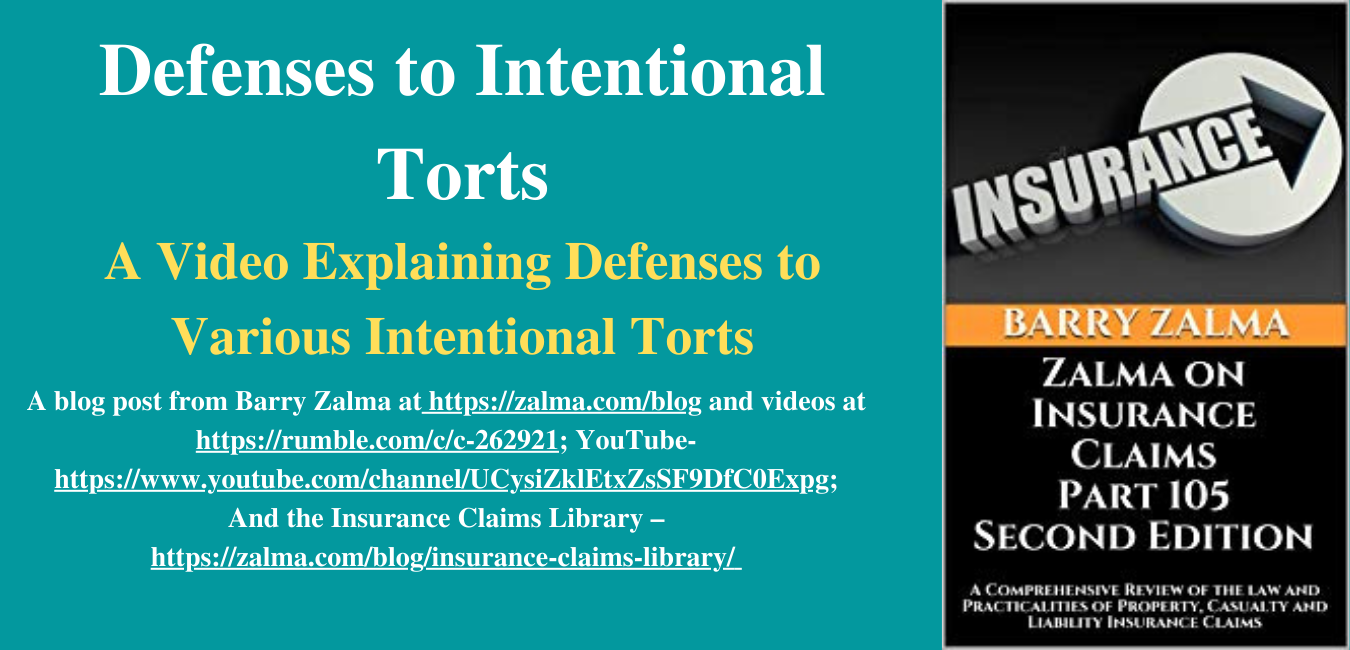-
News Feed
- EXPLORE
-
Pages
-
Groups
-
Events
-
Blogs
-
Marketplace
-
Offers
-
Jobs
-
Developers
Defenses to Intentional Torts

A Video Explaining Defenses to Various Intentional Torts
Read the full article at https://www.linkedin.com/pulse/defenses-intentional-torts-barry-zalma-esq-cfe-1c and see the full video at https://rumble.com/c/c-262921 and at https://youtu.be/T4YWipHFaVI and at https://zalma.com/blog plus more than 3850 posts.
Self-Defense and Defense of a Third Party
The California Civil Code states:
Any necessary force may be used to protect from wrongful injury the person or property of oneself, or of a wife, husband, child, parent, or other relative, or member of one’s family, or of a ward, servant, master or guest. (California Civil Code § 50)
The person must reasonably believe that danger exists, and must use only such force as is reasonably necessary.
Use of Deadly Force
Deadly force or force likely to cause bodily harm is not justified merely in defense of property. Spring guns or other deadly mechanical devices are to be used only if deadly force is justifiable. Deadly force may be used against a felonious trespasser.
Defenses to Defamation
Defenses to charges of defamation include, but are not limited to truth. This is a complete defense. Reasonable, but erroneous belief in the truth of the accusation is no defense. The erroneous belief merely changes the tort from intentional to negligent defamation.
Defenses to False Imprisonment
Reasonable detention without arrest is a judicial privilege codified by California Penal Code § 490.5(f)(1). For example, a storekeeper who believes a theft has been committed may detain the suspected person for a reasonable time.
Defenses to Malicious Prosecution
A termination of a case consistent with guilt or with civil liability is not a basis for the tort of malicious prosecution. The plaintiff must show that the original action was brought without a lack of probable cause to make the criminal charge or to file the civil suit. If the defendant honestly and reasonably believed in the truth of the charge, the element requiring a favorable termination of the original case fails. The defense must be independently proved. It cannot be inferred from proof of malice. Advice of counsel is a defense establishing probable cause.
We are 100% funded for October.
Thanks to everyone who helped out. 🥰
Xephula monthly operating expenses for 2024 - Server: $143/month - Backup Software: $6/month - Object Storage: $6/month - SMTP Service: $10/month - Stripe Processing Fees: ~$10/month - Total: $175/month
- Art
- Causes
- Crafts
- Crime
- Dance
- Drinks
- Film
- Finance
- Fitness
- Food
- Games
- Gardening
- Health
- Home
- Literature
- Music
- Networking
- Paranormal
- Other
- Politics
- History
- News
- Party
- Science
- Religion
- Shopping
- Sports
- SyFy
- Politically Incorrect
- Philosophy
- Theater
- Technology
- Wellness



